Sleep is sometimes mistaken as a luxury or a negotiable period of rest, yet a plays a vital role in a child’s life- whether it is a baby learning to crawl or a teenager experiencing first love.
Sleep defined by the Oxford dictionary is “a condition of body and mind that typically recurs for several hours every night, in which the eyes are closed, the postural muscles relaxed, the activity of the brain altered, and consciousness of the surroundings practically suspended.” But from growing research we know it is more than that basic definition; it is involved in all aspects of physical, mental, emotional health and learning and memory.
Unfortunately1 in 3 children experience some form of sleep disturbance which if not addressed can result in long term sequalae.
Why Sleep is So Important for Children
While a child may appear to be quietly sleeping, the brain is actually very active during this time help with different aspects of development and growth.
- Physical Health: Sleep helps kids grow, keeps their immune system strong, and supports a healthy weight.
- Mental and Emotional Health: Good sleep helps kids stay calm, manage their emotions, and avoid issues like hyperactivity or moodiness.
- Learning and Memory: Sleep helps kids remember things they learn, stay focused, and pick up new information.
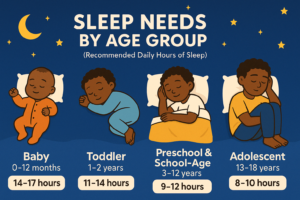
How Much Sleep Do Kids Need?
As kids grow the quality, and the quantity of the sleep required changes with the developmental needs of the body at the time. The quantity of the sleep decreases from 17 hrs as a baby to 10 hours in adolescence. A child may be in bed for the quantity of time required but due to exogenous problems like upper airway obstruction, uncomfortable sleeping area, restless legs, or other parasomnias, the quality of sleep may be impaired.
What Happens During Sleep?
Sleep is not a single state but is made up of cycles each with different stages. This is what can be reference as the quality, having sufficient stages of each cycle.
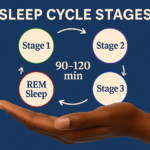 NREM (Non-Rapid Eye Movement) Sleep
NREM (Non-Rapid Eye Movement) Sleep
Stage 1–2: Light sleep, where the body begins to relax
Stage 3: Deep (slow wave) sleep, important for memory, learning, and physical recovery
REM (Rapid Eye Movement) Sleep
- Most dreaming occurs here
- Crucial for processing emotions, consolidating memories, and brain development
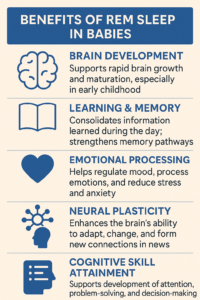
The percentage of sleep for the different stages varies by age and the developmental needs of the child or young person. A baby is experiencing new things every minute of the day and it is amazing the changes that sometimes seems to occur during a short period of time. 50% of a newborn baby’s sleep is usually REM (rapid eye movement) because this help to process the vast amount of information experienced in the first year.
In adolescence only 20-25% of the sleep is REM but the brain is undergoing significant changes like the pre-frontal cortex; which is essential for emotional processing of memories of fear, stress, happiness, learning, memory and mood regulation. Most of the REM sleep in adolescence occurs during the later part of the sleep period, so waking up before completing the REM sleep can affect an adolescence ability to achieve academic success and deal with the myriads of emotions that puberty entails. Poor sleep can impact impulse control and decision making in adolescence.
Sleep in Children and the effect on school and learning
Although inefficient and insufficient sleep can have detrimental effects on all parts of a child’s life the current focus will be on its impact on school and learning.
How Sleep Helps with Learning, Memory and Emotional regulation
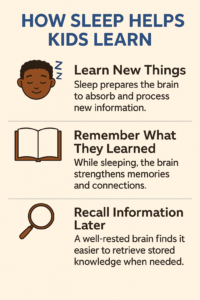 It has been long known that sleep must have some impact on memory and learning from the first century. Recent research have indicated that the slow wave period of sleep is especially important for memory and recall, with sleep improving recall by 20-30% likewise lack of sleep can decrease learning by 40%, this is importance for children staying up overnight to study before an exam which may hinder their academic potential. During sleep there is movement of information from the short-term memory to the long-term memory with linkages being made to previously known information. Sleep allows the brain to prune our memories of new information to what is important and what can be discarded.
It has been long known that sleep must have some impact on memory and learning from the first century. Recent research have indicated that the slow wave period of sleep is especially important for memory and recall, with sleep improving recall by 20-30% likewise lack of sleep can decrease learning by 40%, this is importance for children staying up overnight to study before an exam which may hinder their academic potential. During sleep there is movement of information from the short-term memory to the long-term memory with linkages being made to previously known information. Sleep allows the brain to prune our memories of new information to what is important and what can be discarded.
As well as impacting a child’s academic potential, sleep also can affect the behaviour of a child. A sleep deprived child would not have had the opportunity for emotional regulation which is one of the benefits of sleep.
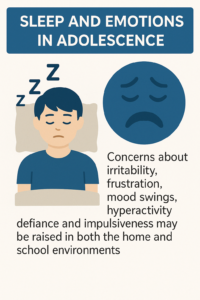
A sleep deprived child may not be able to take part in normal social interaction which may cause problems with peers. A sleep deprived child who is unable to keep up with academic requirements may experience depression and anxiety
Supporting your child sleep
If your child is struggling with sleep, know that help is available. Sleep concerns can often be addressed with support from a medical or allied medical professional, behavioural strategies, or—in some cases—medical or surgical treatment.
Some simple strategies include
- Stick to a consistent bedtime and wake-up time
- Create a calm, screen-free wind-down routine
- Keep the bedroom cool, quiet, and dark
- Rule out any physical sleep issues (like snoring or discomfort)
A diagnosis of pediatric diabetes can be overwhelming for both children and parents. This article breaks down the basics of managing pediatric diabetes, including signs to look out for, treatment options, and lifestyle adjustments. With the right knowledge and support, parents can help their children lead healthy, fulfilling lives.





